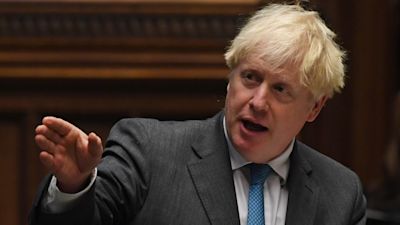PM admits UK 'doesn't have enough' Covid testing capacity as he pledges 500,000 by end of October

Video report by ITV News Political Correspondent Romilly Weeks
Boris Johnson has admitted the UK doesn't have enough coronavirus testing capacity at present as he promised it would increase to 500,000 by the end of October.
The government has been heavily criticised over the testing system, with some people having to wait days for a result and others being told to drive for hours to get a test.
The prime minister blamed the testing shortage on people seeking to book a test without experiencing coronavirus symptoms.
Asked at the Liaison Committee whether the UK has enough testing capacity, the PM responded: "No, we don't."
Hancock admits testing issues could take 'weeks' to resolve amid demand surge
Operation Moonshot: The UK’s plans for mass coronavirus testing explained
"We don't have enough testing capacity now," he admitted, "because, in an ideal world, I would like to test absolutely everybody that wants a test immediately."
He said ministers are doing "everything" that they "possibly can" to increase testing capacity to 500,000 by the end of October.
That includes "automation, batch testing, securing supplies abroad", he said, adding: "Testing capacity just in the last two weeks has gone up 10%."
To reach 500,000 tests a day the UK would need to double its current capacity, which stands at 244,000.
Professor Linda Bauld says the timing of this problem is deeply unfortunate, because of the case rises across the UK.
Last week the prime minister committed to "Operation Moonshot", which he said could see up to 10 million tests carried out every day from the comfort of people’s own homes.
But reaching that point could require the government to spend £100 billion.
With the UK short on cash amid the fight against coronavirus, Mr Johnson told the Liaison Committee that the financial implications of a second national lockdown would be "disastrous".
"I don't want a second national lockdown - I think it would be completely wrong for this country and we are going to do everything in our power to prevent it," he said.
"And can we afford it? I very much doubt that the financial consequences would be anything but disastrous, but we have to make sure that we defeat the disease by the means that we have set out. "
Watch as Boris Johnson appeared before the Liaison Committee
Mr Johnson said demand for tests has "massively accelerated in last couple of weeks", leading to a shortage.
Four new labs were being built across the country and 300 people were being hired, he said.
The prime minister conceded that "many people have had infuriating experiences" with the testing system, but said "89% get their results within 24 hours, if you have an in person test".
ITV News Science Editor Tom Clarke explains why testing is so important
Covid-19 tests not available in some of worst virus-hit areas of England
Schools struggle amid 'increasingly out of control' testing chaos
But on Wednesday coronavirus tests were not available in some of England’s worst affected and some people were offered slots well over 50 miles away.
It was not possible to book a Covid-19 test in Bolton - which currently has the highest infection rate in England - on Wednesday morning.
But those trying to book a test in Hyndburn were offered a walk-through in Bolton at Mere Hall car park, as well as a drive-through at Royal Blackburn Hospital, according to the Government website.
At the committee, the PM said: "We are trying to get as many tests out as we possibly can. But 89% get their results within 24 hours, if you have an in person test.
"And the distance that you have to travel to get a test has come down just in the last week. On average from about six or seven miles to about five miles. "
It was a busy day for the prime minister, who took questions from the committee just hours after facing Labour's deputy leader Angela Rayner at PMQs.
It is only the second time Mr Johnson has appeared before the Liaison Committee since he became prime minister in July last year.
Traditionally the committee - which is made up of the chairs of all the other Commons committees - is able to question the PM three times a year, but Mr Johnson has rejected a number of requests.
The committee was forced to wait almost a year for his first appearance, which eventually came at the end of May amid the controversy surrounding his chief aide Dominic Cummings' trip to Durham.
Critics say the committee is unable to properly scrutinise the prime minister, because its chair, Brexit supporter Sir Bernard Jenkin, is seen to be an ally of Mr Johnson and was selected for the role by Number 10.